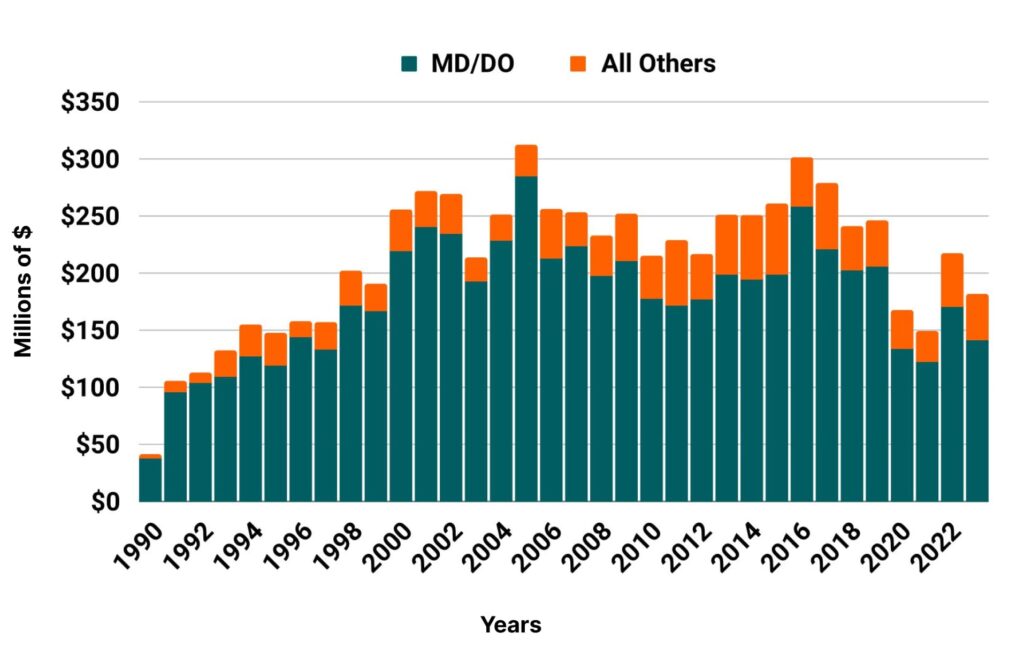Start Your Custom Quote Process™

Malpractice Insurance for Doctors & Physicians in New Jersey
Let our specialists compare medical malpractice insurance quotes for your practice in New Jersey
Our partners








Table of Contents
- Medical Liability Claims Trends for New Jersey Malpractice Insurance Healthcare Providers
- How to buy medical malpractice insurance in New Jersey.
- How to save money on your malpractice insurance.
- How much does medical malpractice insurance cost in New Jersey?
- Medical malpractice requirements in New Jersey.
- Find Coverage for your Practice
- Client Testimonials
- Best medical malpractice insurance companies in New Jersey.
- Why partner with Cunningham Group in New Jersey?
- Historic medical malpractice insurance rates in New Jersey – since 2000.
- History of malpractice insurance in New Jersey.
- Resources for Physicians.
New Jersey Malpractice Insurance
New Jersey has a historically high frequency of medical liability lawsuits and malpractice insurance rates to match. Though less expensive than neighboring New York and Pennsylvania, New Jersey is still an expensive state for physician liability coverage.
Our 2023 Physician Buyers Guide for purchasing malpractice insurance in New Jersey gives you the information necessary to obtain the strongest, most financially secure policy at the best price. When shopping for coverage, you need a full view of the New Jersey marketplace to find the company that best fits your situation. Choose a broker that can offer multiple quotes from all the major malpractice insurance companies in New Jersey.
Medical Liability Claims Trends for New Jersey Malpractice Insurance Healthcare Providers
New Jersey Malpractice Insurance NPDB from 1990 to 2023

How to buy malpractice insurance in New Jersey.
The best way to buy malpractice coverage is to work with a reputable malpractice insurance broker in New Jersey who can generate multiple quotes. Your broker will walk you through the lengthy insurance application and underwriting process. Click to get medical malpractice insurance quotes from every major New Jersey malpractice insurance company.
Typically, the malpractice insurance purchasing process goes like this:
- Submit your information for your free medical malpractice insurance quote from every major insurance company in New Jersey.
- One of our veteran malpractice insurance agents who specializes in the New Jersey market will contact you to learn more about your specific needs.
- We shop your coverage to every major insurance company in New Jersey.
- We present you with a number of insurance quotes and give you the information necessary to make an educated and informed decision. Don’t worry. We’re here every step of the way, helping you get the best price with the best company.
- At renewal time, we restart the process of shopping your coverage among every major carrier to keep your policy properly priced.
How to save money on your malpractice insurance.
- The easiest way to save money on your medical malpractice insurance policy is by working with a broker who has the access to generate quotes from every major insurance company, offering an accurate view of the marketplace. As one of the top brokers in New Jersey, we can guide you through the application and underwriting process so you’re confident you secured the best price with the right insurer for your situation.
- The most common limits in New Jersey are $1 million/$3 million. Limits of liability play a major role in determining the overall cost of your policy. Some companies will offer lower limits to save you money. We don’t recommend this. We want your risks fully indemnified so you never have to pay an award out of pocket. Let us save you money by shopping your coverage rather than skimp on protection.
- Check out our 7 secrets your medical malpractice insurance agent won’t tell you page to get insider information on buying coverage in New Jersey.
How much does medical malpractice insurance cost in New Jersey.
Rates for physician malpractice insurance don’t vary much depending on where you practice within the state. Most major insurance companies classify New Jersey as a single territory, which means your specialty’s base rate does not vary depending on your practice address. But you still want multiple quotes to get an accurate view of the marketplace. This is one of the many reasons it’s important to work with an insurance agency that specializes in medical malpractice insurance. Below are mature, base rates with no credits or discounts. We typically get our clients a 30-50% reduction from these rates:
New Jersey
- Internal Medicine Average Rate $14,310
- General Surgeon Average Rate $49,321
- OB/gyn – Average Rate $81,674
Other Specialties
The cost of your malpractice coverage can vary greatly due to a number of factors, including your claims history, the type of patient interactions you have, the insurance company you are placed with and more. Cunningham Group created this premium estimation tool by drawing from its database of thousands of physician clients. Below are five malpractice estimation premium buckets to gauge how expensive your coverage should be. The buckets are numbered 1 to 5 — with #1 being the least expensive and #5 the most costly.
- Lowest
- Low
- Medium
- High
- Highest
Medical malpractice requirements in New Jersey.
Limits of Liability: The most common limits of liability in New Jersey are $1 million per claim with an annual aggregate cap of $3 million.
Most hospitals require a physician carry malpractice insurance prior to granting admitting privileges. Some of the hospital systems require this include, but are not limited to, Hackensack University Medical Center, Englewood Hospital, Capital Health in Pennington, and Robert Wood Johnson University Hospital in New Brunswick.
Find Coverage for your Practice
-
Individual Physicians
Learn MoreFind peace of mind for your practice. Allow us to locate suitable malpractice coverage from top providers, offering multiple quotes for your convenience.
-
Tail Coverage
Learn MoreSecure your future with Tail Insurance. Protect yourself from past claims with extended liability coverage—multiple quotes to match your needs.
-
Medical Directors
Learn MoreLead confidently with comprehensive malpractice coverage. We specialize in finding tailored plans from various providers for medical directors like you.
-
Telemedicine Coverage
Learn MoreNavigate the virtual frontier with confidence. We help find comprehensive malpractice coverage for telemedicine practitioners, offering multiple quotes.
-
Moonlighting Coverage
Learn MoreMoonlight with confidence when you have the right protection. Get various malpractice coverage options, ensuring you’re covered wherever you practice.
-
Surgeons
Learn MoreLet us identify the ideal malpractice coverage from top providers so you can focus on excellent surgical outcomes.
-
OBGYNs
Learn MoreSecure specialized malpractice coverage for women’s health. We provide tailored solutions with multiple quotes to meet the specific needs of OBGYNs.
-
Dermatologists
Learn MoreProtect your dermatology practice confidently. We specialize in comprehensive malpractice coverage, delivering multiple quotes so you can choose the one that matches your needs.
Client Testimonials
Below is what a few clients have to say about our prices and service. We know that cost and trust are the two most important factors when shopping for your medical malpractice insurance. We pride ourselves at being the best at both!
Internist in New JerseyDavid, thank you very much. You did such a great job with my policy. In a short time you helped me with the changes I so urgently needed. I would recommend you to anybody that needs Malpractice Insurance. Keep up the great work my friend.
Internist in New JerseyThank you again for your efficiency, patience and understanding in helping me obtain my own malpractice for the first time. I will certainly refer my colleagues to you and your firm.
Best Medical malpractice insurance companies in New Jersey.
- Medical Protective
- The Doctors Company
- Coverys
- Positive
- Princeton
- ProSelect
Why partner with Cunningham Group?
Partnering with Cunningham Group will give you a full view of the New Jersey marketplace.. Our veteran insurance agents average 10+ years of industry experience. Let us help you secure medical malpractice insurance quotes from every major insurance company in New Jersey.
Historic Medical Malpractice Insurance Rates in New Jersey for Physicians.
Brief History and other important facts of medical malpractice insurance in New Jersey.
New Jersey has had a hard time attracting and retaining physicians, leading to shortages, particularly in primary care and specialties like obstetrics. Limited reforms implemented in 2004 have helped to ameliorate the situation and have kept rates lower than they otherwise might have been.
Tort Reform in New Jersey
Tort reform has been attempted many times in the Garden State, and many smaller reforms have been carried out. Currently, New Jersey has a cap on punitive damages of $350,000 or five times the compensatory damages, whichever is greater. Reforms to joint-and-several liability, collateral source reform and limits on attorney fees are also in place. Smaller claims of $20,000 or less must be submitted to arbitration and voluntary arbitration is available for larger claims. Plaintiffs in New Jersey must also submit an Affidavit of Merit within 60 days of filing a claim.
Physician protections were slightly eroded in 2018 when the New Jersey Supreme Court ruled that hospitals and doctors must share the facts of their treatment with patients who are suing for medical malpractice and cannot hide behind a landmark state law that permits a confidential examination of why mistakes occurred. The state’s highest court clarified the intent of the state’s Patient Safety Act of 2004, which encouraged healthcare workers to have frank conversations about “adverse events,” with the goal of preventing future errors. Those discussions and any written analysis from them are still private, according to the decision, but the ruling states that patients are entitled to the facts contained in medical records and a “narrative that specifies where responsive information may be found.”
Resources for New Jersey Physicians.
Medical Society of New Jersey
Medical Malpractice Insurance Guide
New Jersey Department of Banking and Insurance
New Jersey State Board of Medical Examiners
New Jersey Association of Osteopathic Physicians and Surgeons
New Jersey Medical Group Management Association
NJMMIS
All MD New Jersey Healthcare Defense Attorney Listing
